We did the research and we developed the technology some time in advance, but only now we put "boots on the ground" to prepare the launch in Germany, starting from Berlin.
The idea is simple and it does not take a long time to lay it out to pharmacists. There are patients who cannot or do not want to wait even a couple of hours for the medicine to arrive, therefore they go from pharmacy to pharmacy, or call them, to find the one that has the product on the shelf. Our service can tell them right away which pharmacy has the product in stock, so they can go and pick it up right away.
Our history started in Poland, where we began the project in 2014 and opened the portal to the public in May 2015. Since then, we gained the trust of hundreads of pharmacies and helped up to 220,000 visitors in a single month. More important than numbers are people's stories, though, and these occasionally involved life-threatening situations, where our service was the last recourse to quickly find the medicine that a sick child critically needed.
But now we want to bring the similar service to Germany. Why we chose this country to be the first one, and how it differs from our homeland?
Big country, full of community pharmacies
Germany has population twice as large as Poland. However, the number of pharmacies, at 20,000 compared to 15,000, is not that much higher. The German law has been more restrictive and it is not possible to easily open pharmacies next to each other, like we have seen in Poland.
When looking at aggregated value of sales in all pharmacies, they stand seven times higher: this shows the still existing discrepancy in incomes of both countries and also much higher potential that the average German pharmacy has.
Most important for us, however, is structure of the market. In Poland the law was liberal in terms of preventing consolidation, or rather, the restrictions which were in it were easily bypassed. As a result, the chains rapidly expanded, with the largest one reaching 600-900 locations (depending on whether you include franchise pharmacies). Individual pharmacies has been losing competition and decreasing in numbers. Only recently the law imposing ownership restrictions similar to German one was passed.
In Germany there have been restrictions on pharmacy ownership for a long time. As a result, there are only community pharmacies, with a maximum of 4 locations that one pharmacist can have. What's more important, the law is obeyed in general, with only some difficulties in enforcement related to cross-border online commerce.
Our service is of course open to any pharmacy irrespective whether it belongs to a chain or not. It might be even easier for us initially to deal with chains, since one decision maker can sign up a large number of pharmacies to join at once.
However, it is always better for a marketplace like us to have a diversified group of providers. A chain with large number of pharmacies could dominate the search results just by having large proportion of our pharmacy base, which could give patients the impression that the service is not independent. In Germany there is no such difficulty, though on the other hand, it is necessary to establish relations with a large number of pharmacy owners.
Another thing about Germany is that e-commerce is quite constrained for pharmaceutical products, especially prescription medicines. Actually, despite the fact that the country is much larger, domestic online pharmacies have smaller scale than players in Poland. For us, it is a positive factor: our service is online, but it directs patients to brick-and-mortar pharmacies, rather than going the route of online purchase and delivery.
Lands do seem really different
One surprise for those coming from a centralised country like Poland is that the states (lands) do in fact differ significantly. In Poland we also have regions with some local government functions. However, I cannot recall for it to have any impact on everyday life while moving from region to region.
In Germany, on the other hand, states might even have different holidays. For example this week, when I expected it to be a holiday on Thursday because of Corpus Christi, it is in fact a working day here in Berlin - though it is indeed a holiday in several other states.
As far as the pharmaceutical world is concerned, there are also differences between states. For example, as we noticed (though not yet analysed in depth) this can apply to regulatory prices system. While prices themselves might be the same in all Germany, the selection of products that might be offered as substitutes or require co-payment might be different depending on the state and its insurance schemes.
Also, while there does seem to be more producers of IT systems for pharmacies than in Poland, first round of interviews with pharmacies in Berlin revealed that a significant part or even majority of them have the same system provider. Perhaps producers might have minority share countrywide, but enjoy dominant position in their home states.
First impression of Berlin
The city is right to the West from Warsaw, with rail line going more or less straight in this direction. Train takes about five and half hours, borderline acceptable compared to the plane, if one is not planning to go back and forth every couple of days. Unfortunately, the railroad is just about to undergo renovation for the next two years, adding an hour to the journey, perhaps leaving plane to be the only convenient option remaining.
Visiting the previously divided city is sometimes a jarring experience for someone who expects the capital of European powerhouse to look something like Zurich everywhere. Instead, part of the city does indeed feel like affluent Western city, while other parts look more run-down than Warsaw centre, with broken pavements, graffiti and unattended greenery with loose trash floating around.
Looking from the main train station, one sees an area which looks as if war has just ended to one side, and gleaming, seemingly empty government buildings among green lawns, kind of like in Washington DC, to the other side.
Government district, planned and built up during the last twenty years.
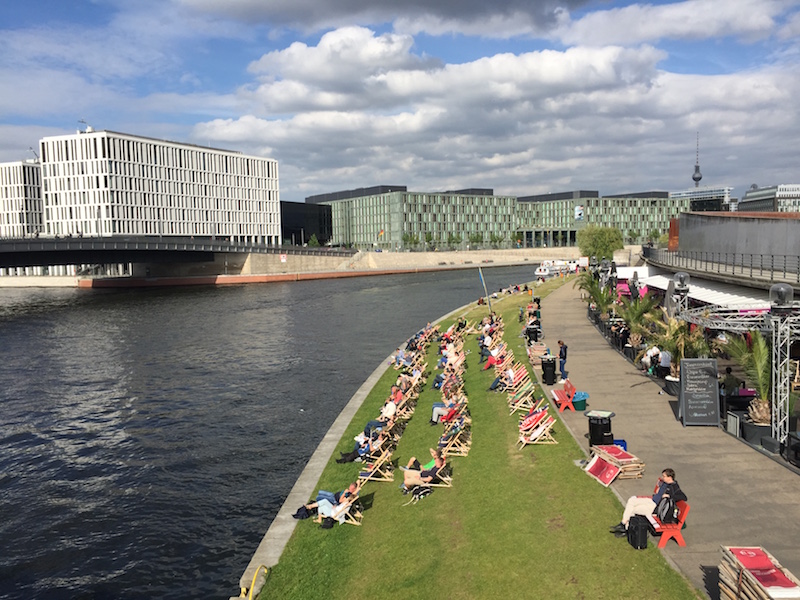
Compared to London, faces on the streets look almost just as diverse, but the city is more spacey, more like Warsaw, with similar amount of construction going on. Streets are usually not so crowded and subway trains are full-sized unlike old, cramped London lines, so moving around is not as overwhelming in terms of excessive contact with other city dwellers.
Prices for daily life expenses are somehow higher
On the first glance, from nominal cost perspective, not giving any consideration to addressable market or funding availability, Warsaw seems clearly less expensive as a place to live and develop a startup.
Eating out is 50% to 100% more expensive: a sandwich with coffee is about 4 euros in Warsaw's popular Green Caffè Nero chain, similar set would be about 6 or more euros in Berlin.
Travel cards for 28 days in Berlin would be 120 euro, compared to about 26 euros for monthly ticket in Warsaw.
Dorm bed in a nice hostel located close to the centre is about 23-25 euros, compared to 12 euros in hostel in the very centre of Warsaw.
One difference is that card terminals are less ubiquitous, and even if they are present, sometimes touch payments are not supported. Therefore having cash is a must.
Visiting Factory, the startup hub
Before coming, I thought I would be spending most of the time in Factory, a startup hub in central Berlin (Mitte).
View on the Factory from outside (building right ahead). Factory Kitchen is on the ground floor.
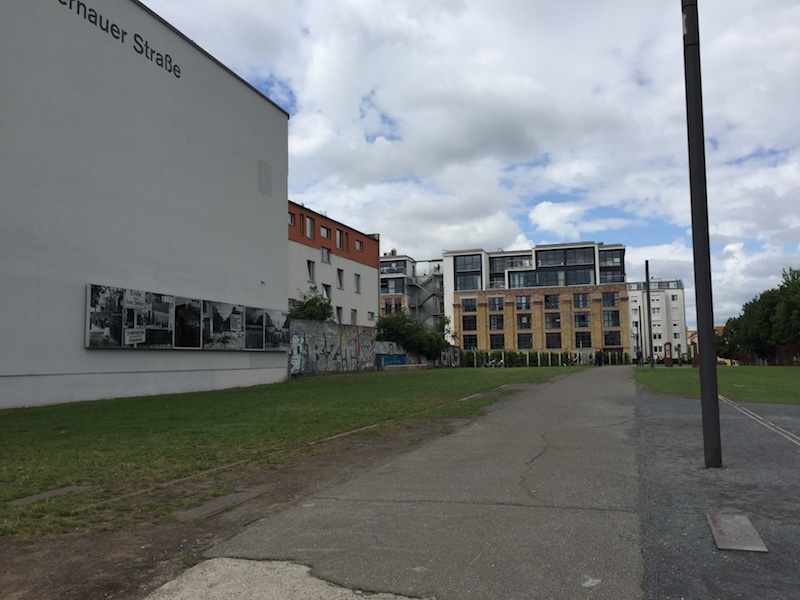
It does seem to be the place where you can meet many other people doing startups. On the first day after the arrival I met Daniel from Medabo, a startup which does online follow-on prescription for continuing treatment with home delivery. It's a different side of the market (online pharmacies) that we are in, but it was nice to exchange first opinions.
As for the Factory itself, however, you cannot just go in and work for a day to see how it's like. The building is only enterable for members, who pay subscription of 50 euros monthly. You also cannot pay for some initial period to try it out. Instead you have to fill a long form to apply for membership, and then wait to see if you are found worthy for, if Daniel remembered correctly, something like two weeks. Frankly, quite involved process, so I skipped it for now.
Most useful of Factory so far seems the Kitchen, which is not as crowded as the office space, does not require passing beauty contest to enter, obviously has good food and coffee, and comfortable sitting. The WiFi was very spotty where I was sitting though, so it's best to use it for meetings and writing long stuff offline.
Factory inside, members' area. Crowded much?
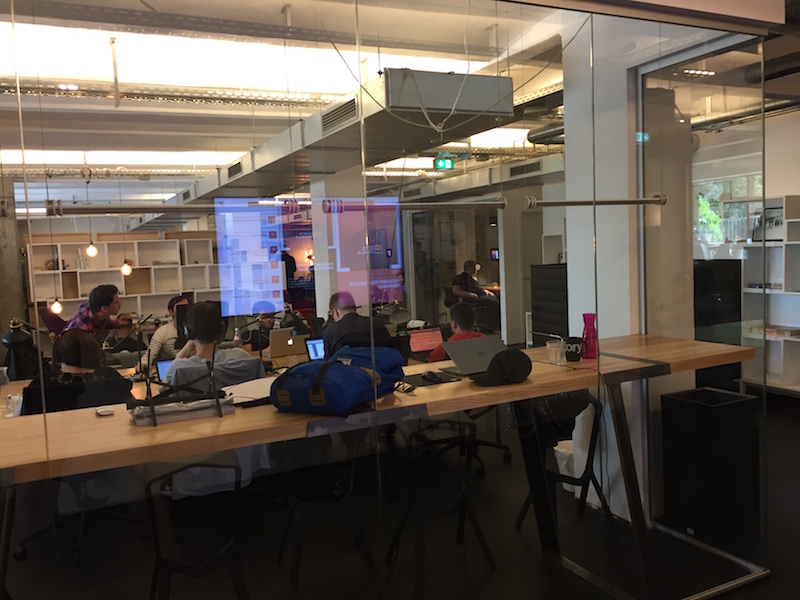
I have not seen other startup hubs yet, such as Mindspace, which is probably quite upmarket, but looking at Factory, it is surprising that Warsaw hubs, like Google Campus Warsaw and others, seem downright luxurious and sparsely populated compared to what I saw in Berlin so far. They are very cheap too: in ballpark of about 150 euros per desk (Brain Embassy, Warsaw) compared to 350 euros and more in Berlin (Mindspace).
I would be interested to see more offices for the future, but so far, the most dependable was, as usual, Regus and its business lounges, which we can use everywhere because of our office with Regus in Warsaw.
First contacts with pharmacies
The real core of the time in Berlin, however, are pharmacies: both the owners and the pharmacists working with patients. What do they think about the idea? Are there any show stoppers that we did not even expect? Can we even reach the owners? Do they speak English? Can we convince them to join us as partners?
When I'm in Warsaw, I spend much of my time walking, which is my favorite and the only sport activity. In Berlin, I did a lot of walking and in the same time visited pharmacies, creating a perfect job for myself.
Großer Tiergarten, one of the better places for walking.
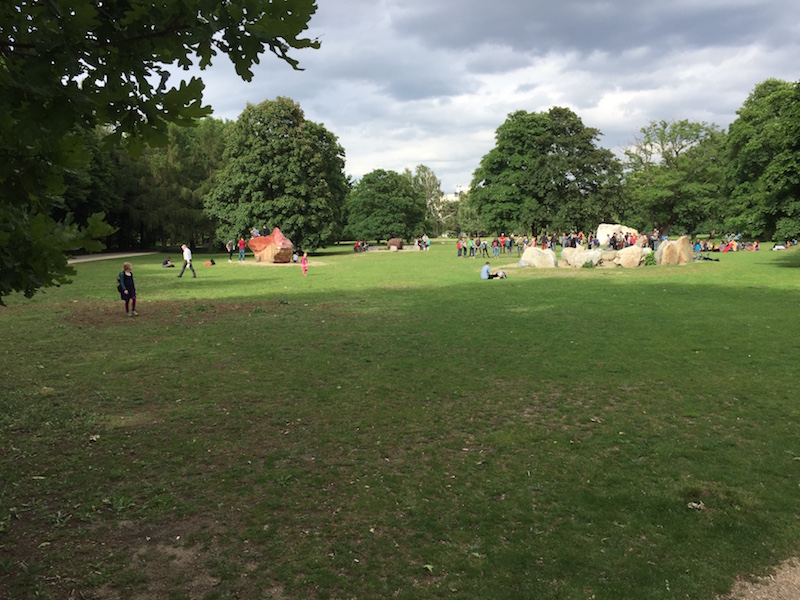
One thing which is extremely nice is how often I was able to talk to the owner just upon walk-in. In Poland there are many chains, and even if the chain is small, it is unlikely for one to meet the owner by a random visit to pharmacy. Another issue is that actual ownership is sometimes less than transparent, because of the before mentioned shenanigans to side-step ownership restrictions. In Germany, on the other hand, I was talking to the owner in about half of the cases.
We want to create a unicorn as much as the next startup, and what better way to start than to partner with pharmacy called "Under Golden Unicorn"? Too bad in this case there was no owner and pharmacist was quite skeptical.
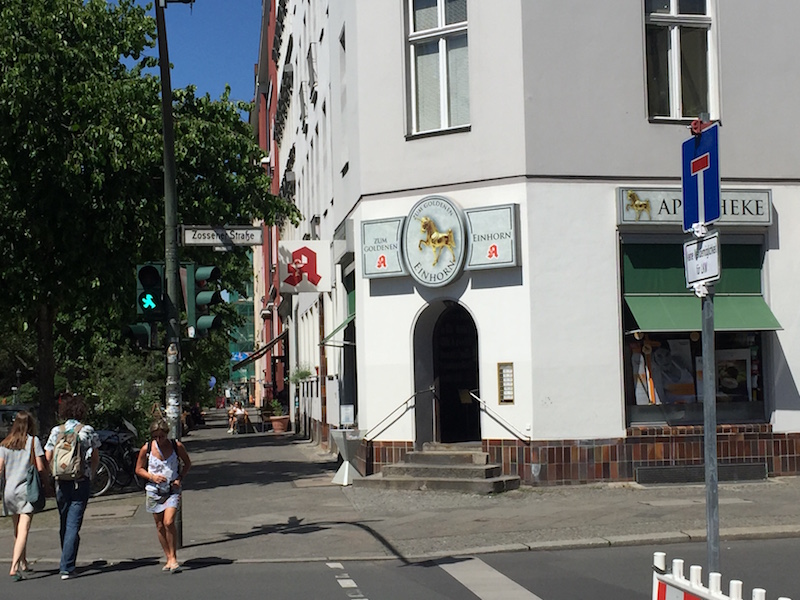
Second nice thing were the pharmacists and their reception to what we do. In every pharmacy I visited I was able to get immediate feedback. Quite often there was no patient inside, which is also good to see, in a sense that pharmacies are not overloaded and can use additional patients that we could direct to them. The response about the patient benefit was overwhelmingly positive.
As it is common when talking to the people doing the actual business, I was learning some stories I wouldn't anticipate. A funny one was about the patients who come in and ask if the medicine is available - same as in Poland, they want to visit as many pharmacies as necessary to have it immediately. But because all pharmacies in Berlin are marked with the same red symbol, these patients assume that the pharmacies are somehow part of one centralised entity and they should be able to tell which other pharmacies might have the medicine in stock. Which they cannot do. Well, until we launch our service, that is.
The language has not proven to be a major problem while visiting pharmacies. I met only two pharmacy owners who did not speak any English.
In one case, a patient who entered just after me did the interpreting. Must have been memorable situation for him: you went down to the pharmacy to buy some painkiller, instead you do impromptu pitch to the pharmacy owner on behalf of some startup you never heard of.
In second case, the pharmacist decided to join us as a partner! I don't speak best German, so the presentation was based on showing rather than telling. But the screens speak for themselves apparently. As a result we have the first pharmacy on the list.
A perfect way to end Friday afternoon and call it a day.

